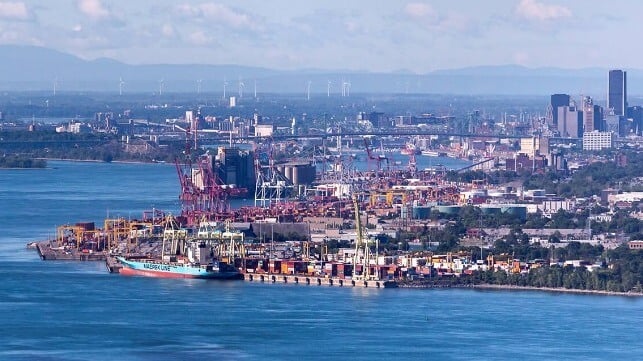Mediation Proposal Rejected to End Overtime Strike by Montreal Dockworkers

Mediation Proposal Rejected to End Overtime Strike by Montreal Dockworkers
A proposal by Canada’s Minister of Labor to restart the mediation process to end the standoff in the labor dispute at the Port of Montreal was rejected with no clear path apparent in the ongoing dispute. For nearly two weeks, the Montreal Longshoremen’s union CUPE Local 375 has been rejecting all overtime assignments in a pressure tactic for the long-running dispute with the Maritime Employers Association.
Minister of Labor Steven MacKinnon met with both sides on October 15 five days after the overtime strike began and proposed appointing a special mediator to oversee a 90-day period of negotiations. He said it would permit the sides to resume negotiations without further pressure tactics.
“The parties have since been unable to reach an agreement. They must find a path forward towards a negotiated settlement as quickly as possible,” wrote MacKinnon Monday night saying his proposal had failed. “Federal mediators and I remain available to assist them, and I will continue to closely monitor the situation.”
The longshoremen’s union announced starting on October 10 it would stop all overtime work as the latest step in the prolonged negotiations. The employers represented by MEA warned it would not pay employees assigned to shifts with incomplete crews while calling for the union to withdraw the pressure tactic and return to the negotiations.
Montreal is Canada’s second-largest port and the largest on the East Coast. The Port Authority warned the overtime strike could result in processing delays and a backlog of containers waiting to be handled. The Port of Montreal said as of October 10 around ten ships expected at the port could be affected by these pressure tactics. The overtime strike is not impacting liquid bulk, grain, and operations to the Atlantic provinces.
“The current overtime strike may slow down or disrupt the handling of around 50 percent of goods transiting through the Port of Montreal, both imports and exports,” the port said in a written statement. “These goods include food, medical and pharmaceutical products, raw materials for industry, consumer goods for retail, as well as a variety of other goods crucial to the operations of thousands of businesses.”
The MEA has said, “Clearly, the current mediation process is no longer producing results.” They said after the minister’s statement that the “time has come to determine the next steps with the support of the Federal Mediation and Conciliation Service.”
The sides met on September 26 and after that, the union filed notice of the 3-day strike impacting two of the port’s container terminals. After the partial strike, they met again on October 4 but three days later the union filed the notice of the overtime strike. The next meeting was on October 15 with the Minister of Labor.

that matters most
Get the latest maritime news delivered to your inbox daily.
The dockworkers have been without a contract for all of 2024 with the union demanding a 20 percent pay increase over four years and improvements in scheduling of shifts. Negotiations have been ongoing for more than a year but the union contends many of the issues are holdovers from its 2020 and 2021 disputes. The Canadian federal government intervened in the prior strike ordering the longshoremen back to work.
The Port of Montreal asserts that the ongoing dispute is hurting its reputation with shippers and carriers and causing cargo to be rerouted. They contend that cargo handled by Montreal longshore workers is down 24 percent since 2022. Recently, the port has been handling more than 120,000 TEU a month but volume was down nearly five percent year-over-year in September as the labor dispute persisted.
